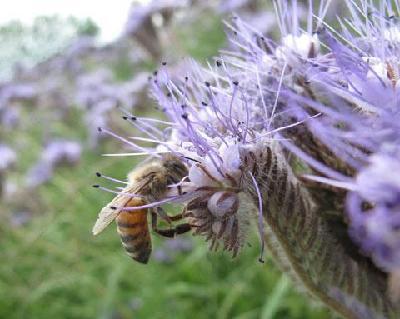分享到

This is the VOA Special English Agriculture Report.
Bees add an estimated 18 billion dollars a year to the value of American crops. They pollinate flowers that become fruits, nuts and vegetables. But, in recent years, honeybee colonies in the United States and Europe have been shrinking. Scientists have proposed different theories to explain what is known as colony collapse disorder.
New research suggests that a commonly used group of insecticides could cause bees to have a hard time finding their way back to their hive.
The new research looks at the use of pesticides called neonicotinoids. They were first used in the 1990s. They are now put on the seeds of many major crops around the world. The seedlings absorb the chemical as they grow.
That means farmers do not need to spray a whole field. Instead there is a little bit of insecticide inside each plant -- including the pollen and nectar that the bees want.
There is not enough pesticide to kill them. But the new research in the journal Science says it may harm them anyway.
Researchers stuck microchips to the backs of the bees. These chips recorded the bees' movements as they came and went from their hive. The scientists fed some bees sugar water with a low dose of a neonicotinoid. The study found that these bees were about twice as likely not to return as other bees.
Mickael Henry from INRA, the French national agriculture research institute, says the bees basically get drunk.
MICKAEL HENRY: "Intoxicated honeybees with those small doses may just get lost and are not able to find their way back home."
For some crops around the world, wild pollinators like bumblebees are more important than honeybees. Dave Goulson at the University of Sterling in Britain worked on another study published in Science. He says the pesticides could help explain why bumblebee populations are also decreasing.
DAVE GOULSON: "There were 85 percent fewer queens produced when they'd been exposed to realistic field levels."
Bayer CropScience makes neonicotinoid pesticides. Company spokesman Jack Boyne disputed the findings.
JACK BOYNE: "Instead of dosing the animals at field-relevant concentrations as the authors intended, they instead dosed them at levels far greater than what would commonly be experienced in the field."
He also notes that researchers are studying other factors that could affect bee populations. These include parasites, diseases and stress caused by transporting beehives to farms.
Some European countries have banned the pesticides. And there are growing calls to ban them in the United States as well.
And that's the VOA Special English Agriculture Report. I'm Jim Tedder.
neonicotinoid: 新煙堿類殺蟲劑
nectar: 花蜜
The Teacher: Bee idioms 成語老師∶蜜蜂成語
New findings about disorder in bees
(來源:VOA 編輯:旭燕)
分享到
關注和訂閱


電話:8610-84883645
傳真:8610-84883500
Email: languagetips@chinadaily.com.cn